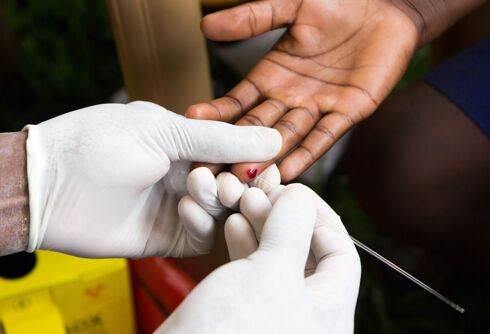It’s the kind of damp, British day that chills you to the bone, but blowing in with the wind to the tiny bookshop, there is a special kind of warmth.
The sections are labeled not “fantasy” and “history,” but “gay,” “lesbian,” and “trans and nonbinary.” Rainbows and Progress Pride symbols adorn the walls and peer from under shelves. I tell the staff I’m looking for queer, polyamorous titles, and instead of a weird look, they offer a selection. Everyone huddled around the olive-hued shelves -flipping through books like “Gay Bar” and “The Queer Mental Health Workbook” – is family.
Related:
There are more books about gays & lesbians. But what about bi people & pansexuals?
Books with bisexual and pansexual characters are out there but are often less explicitly marketed as queer than their gay and lesbian counterparts.
This is Queer Lit, an independent bookstore for the LGBTQ+ community located in Manchester, England. It’s part of a network of belonging that’s spreading across the UK, from London to Glasgow.
With other queer-owned businesses closing at an alarming clip, these shops have never been busier. Built by those who didn’t see space for themselves, they are fueled by a younger generation that knows who they are and can easily discover queer titles on TikTok.
Never Miss a Beat
Subscribe to our newsletter to stay ahead of the latest LGBTQ+ political news and insights.
Just before lockdown, Matthew Cornford, the shop’s owner and managing director, wandered into his local Waterstones, a large British bookstore chain. The three-story building towered over an entire city block, so massive that one window was dedicated to declaring it North England’s biggest bookshop. He sheepishly asked the clerk for the LGBTQ+ section, only to be told they didn’t have one.
Even in a queer-friendly city like Manchester, the titles were scattered all over the store, impossible to find and only collated as a performative gesture for Pride.
“I thought, this needs to change,” says Cornford. Due to COVID, he started Queer Lit as an online store with 700 titles. Today, the brick-and-mortar location boasts nearly 4,000.
The reception was warm, he says.
“There were so many people talking about queer literature online. There was just no hub for them.” This, despite the fact that queer titles won the Booker Prize, the UK’s biggest literature award, for four of the last five years.
The More the Merrier
Community spaces that aren’t bars or clubs are both rare and needed. As I traveled around the UK in 2021 and 2022, I found them everywhere, centering me with the place and my people. Each had its own story but shared culture and resonance. I had never seen anything like it. They were the kind of havens I had been craving in the U.S.
“We were inspired by LGBT bookshops in the U.S., [but] most have shut down,” says Jim MacSweeney, who manages the shop that started it all: London’s Gay’s the Word.
It was opened in 1979 as a community space by a group of gay socialists after one of its founders visited the Oscar Wilde Memorial Bookshop in New York and wanted to create something similar. But in America, big-box bookstores like Borders and Barnes & Noble began suffocating small bookshops in the 1990s. By the 2000s, Amazon had dealt the death knell. In the UK, however, MacSweeney says “it’s gone the other way.”
“After lockdown, people are reading more; new generations have discovered us. We’ve never been as busy.”
Today in England, there is also Juno Bookshop in Sheffield and The Bookish Type in Leeds. There is Paperxclips Books in Belfast, Northern Ireland, and in Scotland, there’s Category Is Books in Glasgow and Lighthouse Bookshop in Edinburgh.
“All of us are part of a community… It doesn’t feel like competitors,” Cornford says, adding that owners frequently stop into each others’ shops. “If we don’t have a book, we’ll call and check whether they do.”
As MacSweeney says: “If you had asked me in the ‘90s about setting up another LGBT bookshop, I would’ve said, ‘That’s brave.’ Now I think, the more the merrier.”
A Critical Third Space
In the past, no mainstream publisher was interested in queer books, and authors relied on independent presses. At first, these were all U.S.-based, but UK presses gradually followed suit.
Today, most of the independents are gone, MacSweeney says. But young people at mainstream presses are picking up the slack, commissioning titles that go viral on social media and become series and films, such as Heartstoppers and They Both Die at the End.
Queer spaces are never just commercial and are always more than what they seem. Political and humanitarian in action, essence, and presence, these bookshops are social enterprises and safe havens that serve the community.
During the 1980s, London’s Pride was organized out of Gay’s the Word. Since then, the shop has given rise not only to book clubs (a lesbian discussion group has met there since 1980, and asexual and trans-masc groups recently formed), but also activist organizations such as the Gay Black Group and London Trans+ Pride, started by a customer who didn’t see a space to meet trans people that wasn’t a helpline.
It’s all about being seen.
Both Paperxclips and Category Is Books also offer community haircuts. Paperxclips co-owner Fern Fitzpatrick quit a finance career to become a barber after their first short cut by a queer person, a transformative experience. With co-owner Ren McGuicken, they created the space they wanted, but didn’t see: a barbershop, bookshop, and coffee shop, a place you can hang out without having to pay. They also host a monthly zine club.
“We have fewer third places [as queer people]. Your only options are spaces you have to pay to exist in,” they say, but at their shop, “Some people just come and crochet for three hours.”
It’s a place people can go for information and support, replacing the role once played by queer bars as those spaces close and more people seek alcohol-free options.
The community needs a place to process what’s going on in their lives, says Fitzpatrick, who fields questions from where to buy a binder to how to find gender services in Northern Ireland to how to learn more about asexuality.
“You couldn’t go into Waterstones and say, ‘My trans partner and I are having issues with sex, is there a book that can help?’” Cornford says. “These are the conversations we have daily. It’s about creating an atmosphere and a community place where people can… open up.”
One Big Queer Family
At Queer Lit, 100 people sign up for their book club each month. The shop even sent copies of trans history books to 300 British MPs to educate policymakers.
Some owners say the UK climate has gotten more outwardly hostile to LGBTQ+ people in recent years. One of Britain’s biggest authors, J.K. Rowling, perpetually fuels trans-exclusionary radical feminist (TERF) ideology.
Still, there hasn’t been the same social or political backlash that the U.S. has seen, MacSweeney says, perhaps a result of the UK’s more secular culture. Where the storefront once suffered broken windows, now it’s an Instagram hotspot. “Just look at all the shoppers,” he smiles, gesturing at the mirror that reflects people of every age and intersection.
As anti-trans sentiment sweeps the U.S.—including a slew of legislation targeting gender-affirming care for youth—queer stories are more vital than ever.
Through a gifting program, Queer Lit has provided 2800 books to allied schools across the UK. On World Book Day, they matched donations, adding nearly 150 copies.
In 2022, the shop supported a unique event for Queer Up, a book aimed at queer and questioning youth, with author Alexis Caught. It also brought schools from all over Manchester together to host a well-being workshop for teens. Cornford thought a few parents might tag along, but to his surprise, 30 showed up along with 50 kids, asking the event hosts for help supporting their teens. So, they created a parents’ workshop, too, on the fly.
If I had spaces and resources like these growing up, everything would have been different.
“Teens are coming in knowing that they’re bi… or nonbinary. They’re buying badges and books and are certainly more confident about who they are,” MacSweeney says. “There’s less shame and more celebrating.” Cornford says some older customers “just start crying, because they’ve never… seen so much about our community in one place.”
One of MacSweeney’s top books of the past year is Now You See Me, which features lesbian life stories from the early days of the queer rights movement. He recalls how a couple of older women came into Gay’s the Word and pointed to the photo of two fresh-faced girls on the book’s cover. “That’s us,” they said.
At Paperxclips, Fitzpatrick observes older customers engaging younger ones, mirroring and serving as role models, asking what books they like and affirming their identities. “They need someone to take them seriously. There’s a little bit of, ‘you’re still a child, that will go away,’” they explain. “When someone in their thirties says, ‘I came out when I was your age, and I’m still nonbinary,’ they recognize there is a future for [them].”
Contrary to what some might expect of a generation raised with smartphones and social media, the kids are not only reading, they’re driving sales and shaping what appears on the shelves.
Books that blow up on TikTok sell by the dozens in days, MacSweeney says, fueling the expansion of categories as varied as the young people are: ace; bisexuality; trans and nonbinary fiction. At Gay’s the Word, the trans section has more than doubled in size, and while “young adult fiction used to be a shelf; now it’s two bays of books.”
Fitzpatrick would have been happy getting 100 social media followers when the shop opened. Instead, they got 1,500. Yet Cornford says Queer Lit and others have seen accounts blocked and posts removed for having queer content on TikTok. Whether in person or online, “Where the community doesn’t get behind you, these spaces disappear so quickly,” he says.
They succeed, as queer people do, by being out and open, reciprocal and resilient.
“There’s nothing like coming into a queer space where, in a very heteronormative world, you’re not other,” MacSweeney says. “You’re among family. These books are for you.”
Don't forget to share:
















